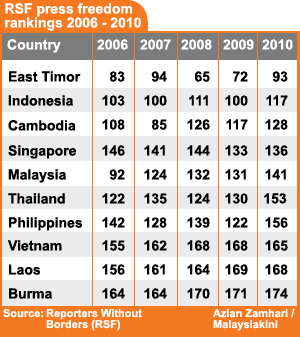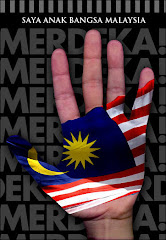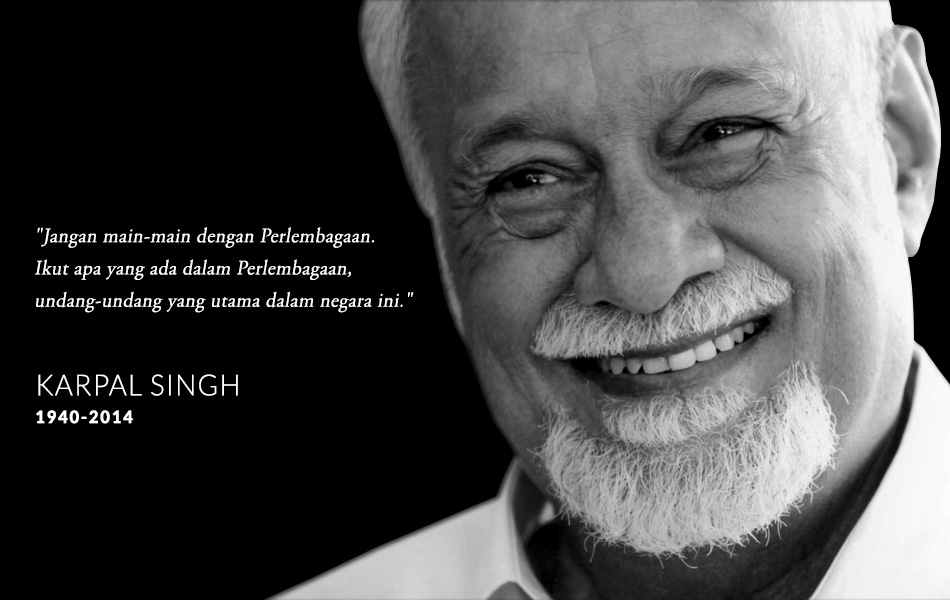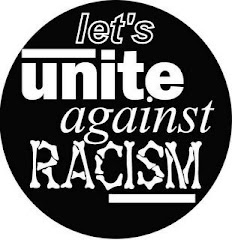Malaysia failed terribly to capitalise on last year's momentum where it moved up one notch from 132 to 131. Recently 2010 World Press Freedom Index shows our nation sunk 10 rankings to 141. In fact, this is the lowest ranking in nine years that putting it firmly in the bottom quarter of 178 countries. Read here for further information: 2010 World Press Freedom Index- Lowest press freedom ranking in nine years
The poor performance of Malaysia is absolute evidence that federal government is not really opens for critics and face the upcoming challenges. A report from Malaysiakini stated that the issues which have perhaps affected Malaysia's poor ranking include the Malaysian Communication and Multimedia Commission's investigation into Malaysiakini's cow-head video, the arrests of bloggers and the ban on a number of books by cartoonist Zunar.
The 2010 Press Freedom Index also stated that Singapore (136) outranked Malaysia for the first time since Paris-based press watchdog group Reporters Without Borders (RSF) began releasing its ranking in 2002. Meanwhile, Finland, Iceland, Netherlands, Norway, Sweden and Switzerland share the No 1 spot. The United States remains at No 20, sitting at the bottom end of the ranking are North Korea (177) and Eritrea (178). Apart from North Korea, Asia's three communist regimes - China (171), Vietnam (165) and Laos (168) - are among the 15 lowest-ranked countries.
Some would have compared Malaysia with Singapore and Brunei, but how things going on in their nation? They have a firm economy to rely on, quality education for their generations, solid performance in combating corruption and look at their marvellous security which guaranty a safe place for their citizen. Do the same thing happen is our nation? We are getting worst in every aspect, plunging terribly in Universities ranking, Press Freedom Index, corruptions, security, budget deficit, judiciary, sports and many more.
Some would have compared Malaysia with Singapore and Brunei, but how things going on in their nation? They have a firm economy to rely on, quality education for their generations, solid performance in combating corruption and look at their marvellous security which guaranty a safe place for their citizen. Do the same thing happen is our nation? We are getting worst in every aspect, plunging terribly in Universities ranking, Press Freedom Index, corruptions, security, budget deficit, judiciary, sports and many more.










7 comments:
memang gagal!
quoting former opposition leader Lim Kit Siang, who said: “Malaysian journalists should come forward to demand the restoration of press freedom in Malaysia and the end of all forms of press censorship, victimization, and discrimination.”
if u ask najib about this.... he will ask u back what is 'freedom of press'
Taste is not a matter for government control nor should NGOs be the arbiters of good taste; encountering bad taste is the price we pay for freedom. If the Chinese public is generally annoyed by McDonald’s TV ad, they can complain to the TV station, who will no doubt take it off the air for fear of losing advertising revenue. This is how it’s done in the US, and this is a way to get it done without encouraging government censorship.
After all, giving the government a blank cheque to censor anything it finds distasteful could backfire. You could be the next one to be censored or even prosecuted for expressing an opinion.
This meant opposing the ruling political elite in Umno-BN, who looked askance at what they saw as journalists taking political sides, as the cause was also taken up by opposition party politicians and other civil society groups, who shared common ground with journalists out of similarly suffering from restrictions on free speech.
In the harsher political climate of Mahathir era, the NUJ’s campaign became muted, except for a short period during the Abdullah Ahmad Badawi government.
However declining newspaper sales — the biggest bread-and-butter issue of all — as well as recent management actions against journalists, has focused minds considerably on the need to make a case for greater press freedom.
Fittingly, Norila was able to close her presidency on a professional note on Thursday in fending off government moves for new publication “guidelines” which she said would make the press irrelevant and slowly kill the newspaper industry; instead she called for an end to newspaper licensing, and for a more open and free environment for the media to discuss and debate issues long held to be “sensitive”.
Let us be brave to admit that press freedom is one of the “blots” in Malaysian democracy, with the electronic media even more unfree and biased than the print media, and that such a stunted plant urgently requires are and space to reach greater maturity –
without which Malaysia cannot achieve the Vision 2020 as espoused by the Prime Minister, Najib
Whatever is popular deserves attention.
Post a Comment